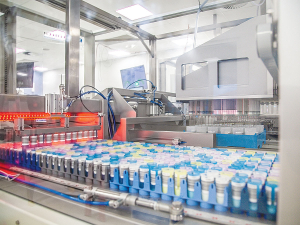2024/25 Dairy Statistics: NZ dairy farmers boost production with fewer cows
According to the New Zealand Dairy Statistics 2024/25 report, New Zealand dairy farmers are achieving more with fewer cows.
 LIC is developing a milk based diagnostic test to give farmers early insight into the facial eczema status of their herd before clinical signs are apparent.
LIC is developing a milk based diagnostic test to give farmers early insight into the facial eczema status of their herd before clinical signs are apparent.
Herd improvement co-operative LIC says it is developing new methods to help farmers tackle facial eczema, a disease which is costing the dairy industry around $30 million in lost production each year.
Facial eczema (FE) is caused by a fungal toxin which is mainly found in summer and autumn pastures in the North Island and Upper South Island. When cattle eat this pasture they ingest the toxin which causes liver damage, lowered production and in some circumstances, skin irritation and peeling.
LIC chief scientist Richard Spelman says the co-operative is leveraging its expertise in genetics and diagnostic testing to help farmers combat the effects of the disease.
"We're focused on helping our farmers optimise value from their livestcok by enabling them to produce the most sustainable and efficient animals," says Spelman.
"There's no cure for facial eczema, so we're working on developing a milk test and a breeding value to give farmers more effective options to help prevent and detect the disease."
Head of VetEnt Research and Te Awamutu veterinarian, Emma Cuttance, says the humid and wet weather created the perfect conditions for the fungus and resulted in a lot of facial eczema in the Waikato.
"We had farmers with whole mobs of cattle with clinical symptoms, which is really tough to see. On the whole this shouldn't be happening but the problem is 95% of the time there is liver damage but you can't see it. It's an iceberg situation."
DairyNZ estimates that for every clinical case of facial eczema, there will be 10 cows that are subclinical - they don't show any physical signs but they have liver damage and milk production can be depressed during the season of damage and the following season as well.
Spelman says LIC is developing a milk based diagnostic test to give farmers early insight into the facial eczema status of their herd before clinical signs are apparent.
"We're working on a milk test which detects liver damage when the herd is exposed to a medium to high toxin level."
Spelman says how this test will be delivered to farmers hasn't been confirmed but the co-op is collaborating with Fonterra to validate whether the test is effective with a bulk milk sample.
"We're also looking into the potential for an individual milk test which could be an add-on to a routine herd test. The individual milk test would provide farmers with a less invasive, more efficient alternative to blood testing."
Cuttance acknowledges the current options for farmers to prevent facial eczema are falling short.
"Zinc is the most common way to prevent facial eczema but the vast majority of the country don't give enough for it to be effective.
There are lots of different areas to be worked on in terms of providing farmers with alternative ways to mitigate the effects of facial eczema - one of those has to be breeding."
Spelman agrees and says the co-op's long-term aim is to develop a facial eczema breeding value, which would allow farmers to breed cows that are more resistant to the disease.
"We know that facial eczema resistance is a heritable trait. If we're able to generate a facial eczema breeding value, we could rank our artificial breeding value, we could rank our artificial breeding bulls based on their resistance for farmers to select from."
To gather the data needed to generate a breeding value, the co-op has collected blood and milk samples from 4,000 cows that have been naturally exposed to facial eczema.
“We’re using ground breaking milk testing alongside traditional blood tests to develop a facial eczema breeding value based on genomics.”
The research into a facial eczema milk test and breeding value is being undertaken through the $25 million Resilient Dairy research programme.
The seven-year Sustainable Food and Fibres Futures programme seeks to enhance the health and wellbeing of the national dairy herd.
“The Resilient Dairy programme strengthens our existing research and development work to keep our farmers and New Zealand leading the global pastoral dairy system,” says Spelman.
Registrations are now open for the 2026 Ruralco Golf Classic, with all proceeds from the event set to support the Mid Canterbury Rural Support Trust.
Mating wrapped up last month at the across-breed Beef Progeny Test on Pāmu’s Kepler Farm in Manapouri.
Libby Judson is a keeper of memories from an age gone by. Tim Fulton tells her story.
A New Zealand-first native tree study has highlighted the Bioeconomy Science Institute's position as a forestry research leader.
Hemp fibre processor Rubisco is relocating its core processing facility to Ashburton as part of a $20-$30 million expansion to leverage what it says is an accelerating global demand for sustainable and renewable fibres.
Tradition meets some of the latest in technology at the 2026 East Coast Farming Expo.
President Donald Trump’s decision to impose tariffs on imports into the US is doing good things for global trade, according…
Seen a giant cheese roll rolling along Southland’s roads?